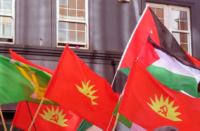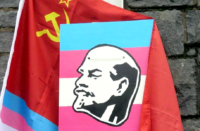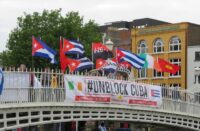In late November the Communist Party of Ireland held it 25th National Congress in Belfast, the highest political authority of the CPI.
The congress brought together delegates from all over the country. It was the culmination of a long process of discussion in the branches on a number of motions, including the main political resolution as well as resolutions on women and on organisation, drafted by the National Executive Committee.
All branches were entitled, and encouraged, to submit amendments to all the motions before the congress.
The CPI has been developing and deepening its knowledge and understanding of the nature of the triple lock of imperialist domination—American, European, and British—on the Irish people, placing this domination in the context of imperialism’s global strategy and the deepening structural and systemic crisis of state-monopoly capitalism.
The congress reaffirmed the party’s total opposition to the European Union and to the social and economic strategy imposed through the numerous treaty obligations. The political resolution as adopted clearly shows that no amount of tinkering with the structures of the EU will work and rejects the false belief that the EU can somehow be “democratised.”
There was a strong debate, reflected in the number of amendments, on the current settlement in the form of the Belfast Agreement, on sectarianism, and on social and economic development. The political resolution states that “challenging sectarianism is a necessary part of the struggle for a democratic advance. It especially stunts the working class in its daily struggles. It needs to be challenged consistently and continually, as every weakening of sectarianism is an advance . . . Its final elimination is possible only in a wider democratic settlement through the democratic reintegration of the national territory, which would be a necessary step in freeing the Irish people from the legacy of dependence and the continued subordination to imperialist interests.”
The political resolution also reinforces the long-held position of the CPI that there can be “no lasting democratic solution to the political conflict and the differences within the political arrangements that have prevailed for nearly a century.” Working-class forces need to “move forward and address the issues that go beyond the Agreement.” In the North some of the areas that need to be advanced are:
- the establishment of the Civic Forum
- the enactment of a Bill of Rights
- the removal of all undemocratic practices regarding arrest and remand
- an Irish Language Act
- the full transfer of fiscal powers
- the removal of all foreign intelligence agencies
- ending the misuse of the “petition of concern” and the corrupting practices associated with SPADs (special political advisers).
The CPI’s strategy is to maximise an all-Ireland approach to economic and social development, centred on the needs and interests of working people—a transformative strategy that strengthens the political and economic position and the interests of workers and weakens the power and control of capital and its institutions and mechanism of control. It is the use of state power that can
- bring an end to poverty, unemployment, inequality, homelessness, hunger, and emigration;
- dramatically increase investment in research and development;
- establish all-Ireland networks to facilitate the development of manufacturing industry;
- use planning and integration to obtain optimum gains from exports from the Republic and from industrial enterprises in the North.
Also urgently required are
- public procurement, whereby any investment must be tailored to the maximum advantage of the greatest number of people, in recognition of the integral connection between economic dynamism and economic justice;
- a genuinely integrated all-Ireland transport system, with appropriate railway and road corridors, not only to facilitate economic progress but to ensure the provision of full and accessible services in such areas as health;
- all-Ireland environmental planning and regulation, with investment in the environment and environmentally responsible projects;
- the establishment of an all-Ireland National Development Bank;
- public ownership of all natural resources and their development by a National Development Corporation;
- breaking with the euro;
- pursuing economic and social policies regardless of what the European Union may or may not allow;
- withdrawal from the European Union, because it impinges on the rights and sovereignty of the Irish people to make their own decisions;
- repudiating the debt; and
- the social control of capital.
The congress elected a new National Executive Committee, half of whom have never been members of the executive. The new NEC has been given the responsibility for developing the work and organisation based on the strategy adopted at the congress. The new NEC also marks a change in the age of the leadership, with a new generation of younger communists taking up leadership positions.





